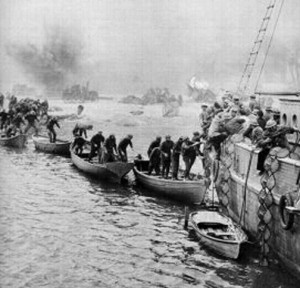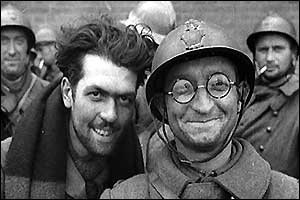The French had collapsed. The Dutch had been overwhelmed. The Belgians had surrendered. The British army, trapped, fought and fell back toward the Channel ports, converging on a little fishing village whose name was then spelled Dunkerque.
Behind them lay the sea.
It was England’s greatest crisis since the Norman conquest, vaster than those precipitated by Philip II’s Spanish Armada, Louis the XIV’s triumphant armies, or Napoleon’s invasion barges. This time Britain stood alone. If the Germans crossed the Channel and established uncontested beachheads, all would be lost, for it is a peculiarity of England’s island that its southern region is indefensible against disciplined troops. . . .
Now the 220,000 Tommies at Dunkirk, Britain’s only hope, seemed doomed. On the Flanders beaches they stood around like souls in purgatory, awaiting disposition. There appeared to be no way to bring more than a handful of them home. The Royal Navy’s vessels were inadequate. King George VI had been told they would be lucky to save 17,000. The House of Commons was warned to prepare for “hard and heavy tidings.”
Then, from the streams and estuaries of Kent and Dover, a strange fleet appeared: trawlers and tugs, scows and fishing sloops, lifeboats and pleasure craft, smacks and coasters, the island ferry Gracie Fields; Tom Sopwith’s America’s cup challenger Endeavor; even the London fire brigade’s fire-float Massey Shaw–all of them manned by civilian volunteers: English fathers, sailing to rescue England’s exhausted and bleeding sons . . .
Thus begins the first volume of William Manchester’s biography of Winston Churchill, The Last Lion. This opening (which goes on for another page and a half) is my favorite of any book––fiction or non-fiction––I’ve ever read. The full three-volume biography, finished by a friend after Manchester’s untimely death, is an uncontested masterpiece of the genre.
And the “Dunkirk miracle” is a historical masterpiece of human grit on a grand and inspiring scale.
It was on this very day, May 26, 1940, that the evacuation began. When it ended on June 4, this citizen’s armada had not only rescued British soldiers, but French support troops as well: a total of 338,000 men!
I’ll tell you the truth, no matter how many times I read Manchester’s opening account, I cannot help tearing up. English fathers, sailing to rescue England’s exhausted and bleeding sons. The courage, the devotion, the duty. If you want to know what it all felt like, I urge you to watch William Wyler’s classic, Mrs. Miniver. In fact, please watch it with your sons and daughters, and talk to them afterward about what that world was like––when neighbor and village and town and country came together for common cause. Teach your children that there is such a thing as right, and good, and truth—and that fighting for those things is a worthy enterprise.
Then talk about sacrifice. Sacrifice is the most humanizing of our actions, for we must fight against our instinct for self-preservation to do it. Yet in such action we become more than the dust of the earth. Our search for meaning gains a foothold and we step upward toward “the better angels of our nature.”
It is no mystery, then, that some of the most enduring stories are about sacrifice. From “the greatest story ever told” to Casablanca. From Samson to Gran Torino. From The Lord of the Rings to Stella Dallas. On and on we go, because the power of sacrifice resonates in the deepest part of us, which also happens to be the part that makes us great.
And when it occurs in real life, as it did 73 years ago, it is transformational. As long as we remember it.
Which is why, on this Memorial Day weekend, I choose to remember our allies, the heroes of Dunkirk. May they rest in peace.



JSB –
Brilliant, inspired and worthy of the men and ideals you salute.
Bravo Sir!
Hrm…the scarf…the hair…the oddly knowing smile…Dr Who???
John 15:13
Greater love has no one than this: to lay down one’s life for one’s friends.
By the way, speaking of remembering, check out my new writing experiment.
In memorium of great writers and combat veterans of the previous generation, Kurt Vonnegut, I found one of his short stories that now resides in the Public Domain and today issued a complete rewrite of it on Amazon. Check out my version of 2BR02B at Amazon for only 99¢ at Amazon & iTunes…audio version coming soon.
Very stirring, Jim. I found myself tearing up reading your words, as well. Please don’t tell anyone, though.
I hope we all remember Memorial Day as something other than a three-day weekend. Thanks.
Amen, Joe, very stirring. I’m wiping the tears as I write. After reading your post from yesterday, I think I need some more bananas and peanut butter.
Amen to all before. Tears here, too. It is very difficult to get people who don’t have veterans (living or gone) to pay much attention to the meaning of this holiday. Thank you.
This comment has been removed by the author.
In his autobiography, biologist E. O. Wilson wrote about the Southern tradition of the citizen-warrior, then added this stirring confession:
“I have a special regard for altruism and devotion to duty, believing them virtues that exist independent of approval and validation. I am stirred by accounts of soldiers, policemen, and firemen who have died in the line of duty. I can be brought to tears with embarrassing quickness by the solemn ceremonies honoring those heroes. The sight of Iwo Jima and Vietnam Memorials pierces me for the witness they bear of men who gave so much, and who expected so little in life, and the strength ordinary people possess that held civilization together in dangerous times.” (p. 25)
Wow, thanks for sharing this clip! It fits perfectly with today’s post.
Thanks James. Lovely post.
Thank you. I recently watched an episode of Foyle’s War that dealt with this event. Both that episode and Manchester’s opening paragraph made my heart swell with pride in the human race. I would love to feel that every day.
LIKE LIKE LIKE
You know, speaking of allies. This morning I was reminded of a man I met back in 1989. He was a missionary for our church and was trying to find ways to get missionaries setup in North Korea. He had lived in that country for three years, 1951-1953. A Korean War vet, he served the Marines as a Navy Corpsman (medic for the Marines). During the 1951 Battle of the Chosin Reservoir, where 25,000 Marines faced off with 67,000 Chinese and North Koreans, his thirty man platoon got cut off and trapped in a North Korean village, surrounded by a half million Chinese Red Army soldiers. The people of this tiny North Korean farming village hid the Marines in the charcoal filled crawl spaces under their homes and passed food and water to them for more than a week while the Chinese occupied the village. Had the villagers turned them in at that time the Marines would’ve been executed, but the village probably spared. As the village waited it grew dangerous. Now, if they had been discovered it would have meant death to everyone there.
The people in that village, even though they were technically the enemy, acted as true allies, protecting and feeding them until the Chinese garrison moved on and the people let the Marines go. Nearly forty years later, when I met the retired Navy Corpsman he could still speak the Korean language, much of which he’d learned in those days under the village.
He said that ‘were it not for our allies in that far northern town, we would have all died.’
“These are the times that try men’s souls.” — Thomas Paine, The American Crisis, 1776
Your best post yet, Jim. Thanks.
I just downloaded The Last Lion, andlook forward to reading it! Thanks, Jim!
Manchester was one of America’s best writers, in style and scope. Put that together with one of the most amazing lives in history, and it couldn’t be anything but great.
I just read the William Manchester passage aloud to my husband and I teared up too. I apologized for doing that.. then I read about your tears and silently retracted my apology. Thank you for sharing so honestly and for the reminder of this day exactly seven months before the day of my birth.. bringing it so luminously back to life.